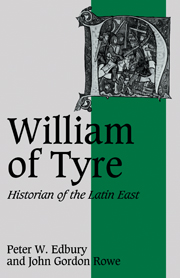Book contents
- Frontmatter
- Contents
- Preface
- Abbreviations and forms of reference
- Introduction
- PART I WILLIAM OF TYRE AND THE WRITING OF THE ‘HISTORIA’
- 1 William's career
- 2 William's historical writings
- 3 Classical and Christian influences in the Historia
- 4 William and his sources
- PART II WILLIAM OF TYRE AND THE MEANING OF THE ‘HISTORIA’
- Conclusion
- Bibliography
- Index
- Cambridge studies in medieval life and thought
2 - William's historical writings
Published online by Cambridge University Press: 09 October 2009
- Frontmatter
- Contents
- Preface
- Abbreviations and forms of reference
- Introduction
- PART I WILLIAM OF TYRE AND THE WRITING OF THE ‘HISTORIA’
- 1 William's career
- 2 William's historical writings
- 3 Classical and Christian influences in the Historia
- 4 William and his sources
- PART II WILLIAM OF TYRE AND THE MEANING OF THE ‘HISTORIA’
- Conclusion
- Bibliography
- Index
- Cambridge studies in medieval life and thought
Summary
Besides the Historia, William informs us that he had written two other works: an account of the decrees of the Third Lateran Council of 1179, with a list of participants, and a history of the Muslim world perhaps entitled Gesta orientalium principum. Both are now lost. William claimed that he wrote his account of the Lateran Council at the request of the other clergy present on that occasion, and he referred his readers to a copy in the cathedral archive at Tyre. The Muslim history was said to have been written at the behest of King Amaury, who had enabled him to carry out his task by providing him with copies of Arabic historical writings including one by the tenth-century patriarch of Alexandria, Sa'īd ibn Batrīk. William alluded to this other work of his no fewer than five times in the Historia, making it clear that in it he had covered the entire span of Muslim history from the time of Muhammad down to his own day. He made contradictory statements about the date at which it ended: twice he stated that it stopped in the year 570 A.H. (i.e. 1174/5), but he wrongly gave the equivalent year of the Christian era as, on one occasion, 1182 and, on the other, 1184; on a third occasion he said that the work ended in 577 A.H., which he correctly identified as A.D. 1181.
- Type
- Chapter
- Information
- William of TyreHistorian of the Latin East, pp. 23 - 31Publisher: Cambridge University PressPrint publication year: 1988



